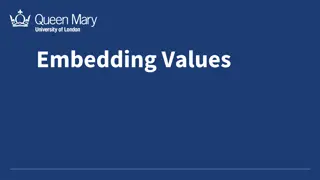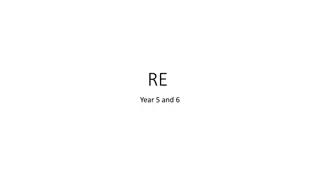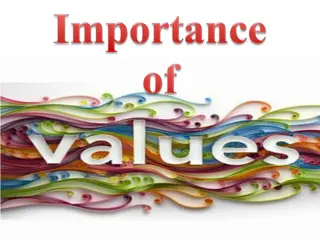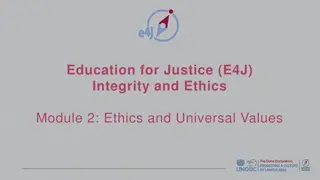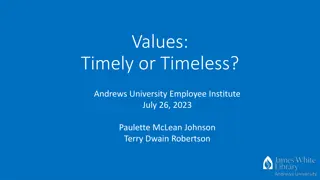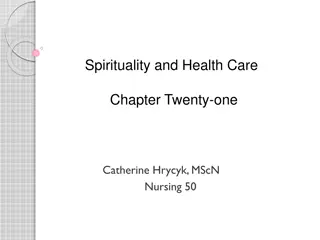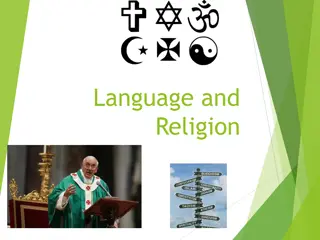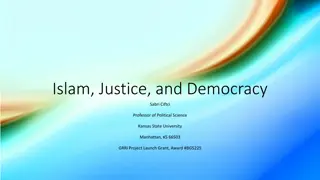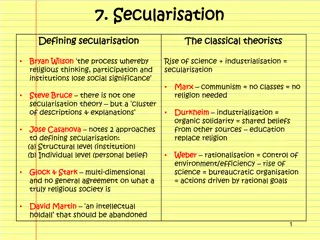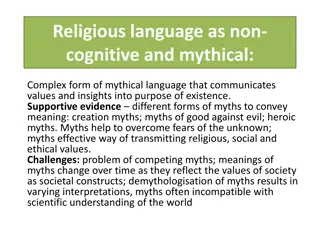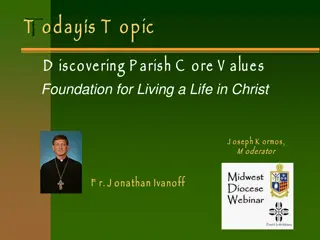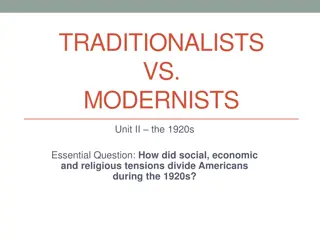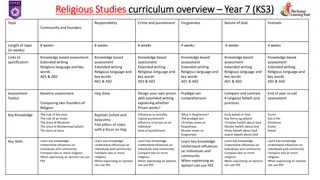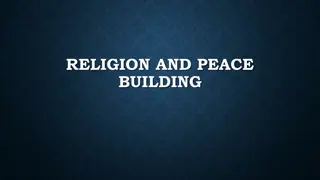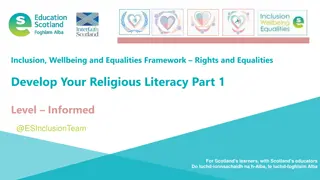Status of Family Laws in India: Hindu vs. Religious Minorities
The family and personal status laws in India vary between Hindu law and those pertaining to religious minorities. While Hindu law has seen extensive reforms, discriminatory provisions still exist. In contrast, laws governing religious minorities have undergone fewer reforms, leading to greater inequ
2 views • 4 slides
Implementing Our Values in Action Toolkit for Team Development
This toolkit focuses on utilizing Our Values in action within teams at Queen Mary to reinforce positive behaviors and create a supportive work culture. Managers are encouraged to lead discussions, allocate work based on values alignment, incorporate values in 1-to-1 meetings, and plan for a Values A
5 views • 19 slides
Understanding Family Morals, Values, and Rules
Developing family morals and values is essential for guiding children and fostering a harmonious family environment. Morals, values, and rules play a crucial role in shaping individual behaviors and decision-making processes. By establishing family guidelines based on strong morals and values, paren
5 views • 15 slides
Religious Education Skills Progression for Years 5 and 6
This document outlines the long-term plan for the RE curriculum for Year 5 and 6 students, focusing on topics such as living by Christian values, exploring wisdom from different faiths, understanding the creation of the world, and expressing faith through art. It also covers the progression of skill
0 views • 31 slides
Growing Careers for Positive Change: Aligning Actions with Values
The lesson focuses on helping individuals align their actions with their values, emphasizing the impact of intrinsic and extrinsic values on personal wellbeing and decision-making. Through activities like Diamond 9 Values, students explore the importance of values in career choice and relationships,
1 views • 15 slides
Understanding Religious Conflict: Definition and Types Explored
Religious conflict is a complex and recurring concept throughout history. Scholars have defined it as disagreements between religious groups. This conflict arises from contentious issues touching on ideology, morality, power, and identity, influenced by various socio-political, economic, and cultura
1 views • 13 slides
Evolution of Akbar's Religious Policy: A Historical Overview
In the 16th century, Akbar the Great implemented a revolutionary religious policy in the Mughal Empire. Initially a devout Sunni Muslim, Akbar evolved his stance to promote harmony and equality among all religions, fostering tolerance and understanding. This shift marked a significant departure from
1 views • 25 slides
Understanding Values, Beliefs, and Personal Values in Everyday Life
Our values and beliefs shape how we think, act, and make decisions in everyday life. Whether conscious or not, they influence our behavior and attitudes. This article explores the definitions and importance of beliefs, values, and personal values, highlighting how they impact individual decision-mak
0 views • 27 slides
Elizabethan Religious Settlement: Unity Amidst Division
Amid religious division in England, Queen Elizabeth I implemented a Religious Settlement in 1559 to unify the country. The settlement, a blend of Protestant and Catholic elements, aimed to maintain peace and prevent rebellions. Elizabeth's strategic compromise pleased most people, though lingering t
0 views • 14 slides
Understanding Secularism: Principles and Advantages
Secularism is the principle of separating government institutions from religious entities to ensure equal rights for believers and non-believers. It safeguards freedom of religious belief and practice, upholds religious freedom, and promotes democracy and fairness. Secularism aims to prevent religio
0 views • 21 slides
The Importance of Values in Building Harmonious Communities
Values play a crucial role in shaping individual behavior, organizational culture, and community interactions. Shared values are essential for promoting harmony, achieving common goals, and fostering mutual respect. When values are not aligned, it leads to conflicts, inefficiencies, and dissatisfact
0 views • 41 slides
Understanding Religious Language: Cognitivism vs. Non-Cognitivism in the University Debate
This discussion explores the debate between cognitivism and non-cognitivism in religious language. Cognitivism asserts that religious claims aim to describe the world and can be true or false, while non-cognitivism argues that such claims express attitudes and cannot be verified. Flew's challenge qu
0 views • 9 slides
Understanding Ethics, Values, and Universal Morality
Explore the concepts of ethics, universal values, and morality in a multicultural context through Education for Justice (E4J) Integrity and Ethics Module 2. Delve into topics such as the Universal Declaration on Human Rights, enacting universal values, moral relativism, and more. Gain insights on th
6 views • 14 slides
Exploring Personal Values in Everyday Life
Discover the importance of values in decision-making and personal development. Engage in activities such as identifying personal values, ranking their importance, and creating a self-identity puzzle. Understand how values influence choices and relationships. Connect values to career decisions and fi
0 views • 9 slides
Exploring Core Values in Higher Education Institutions
Unravel the importance of core values in higher education institutions, examining the interplay between organizational culture, decision-making processes, and the alignment of values with faith and professional beliefs. Delve into the diverse types of values, from permission-to-play to aspirational
0 views • 29 slides
Guide to Using the BSA Calendar of Religious Observances
The BSA Calendar of Religious Observances is a valuable resource for scheduling scouting events in consideration of various religious holidays and observances. This guide provides an overview of the calendar, highlights important dates, and emphasizes the importance of respecting religious diversity
0 views • 8 slides
Understanding Spirituality and Health Care in Nursing Practice
Exploring the concepts of spirituality, religious versus secular perspectives, spiritual distress, and the role of nurses in providing spiritual support during times of transition and vulnerability. Spirituality is defined as a sense of meaning in life and inner spirit, central to creating beliefs a
0 views • 11 slides
Understanding the Role of Language in Religion
Exploring the significance of language in religious contexts, this content discusses the functions, features, lexicon, grammar, and metaphorical aspects present in religious language. It delves into how religious language upholds spiritual beliefs, persuades believers, and expresses specific attitud
0 views • 8 slides
Exploring Values Education in Nordic Preschools
This study delves into the perception and handling of values in Nordic preschools, focusing on caring, disciplinary, and democratic values. It aims to uncover whether conflicting or co-existing values prevail within individual preschools and across Nordic countries. Definitions of values, including
0 views • 16 slides
Understanding the Cultural Dimensions of Food and Religious Influences in Culinary Arts
Explore the impact of religious beliefs on food traditions and dietary restrictions across different cultures in the culinary world. Learn about the influence of major world religions on eating habits, food choices, and culinary practices. Discover how various religious groups, such as Christians, o
0 views • 26 slides
Understanding Moral and Constitutional Values in Relation to Judiciary
Explore the concepts of moral values and constitutional values, emphasizing their importance in decision-making processes and societal norms. Discover the stages of moral development and delve into constitutional values such as sovereignty, socialism, secularism, democracy, justice, liberty, equalit
0 views • 9 slides
The Vital Role of Religious Institutions in Supporting Immigrants
Religions and immigration are interlinked in modern societies, where religions play a significant role in providing services, defending rights, and supporting the social cohesion of immigrants. Mainstream religious institutions serve as key actors in offering assistance, advocating for migrant right
2 views • 14 slides
Understanding Religious Language: Flew, Hare, Mitchell
Exploring the contrasting views of cognitivism and non-cognitivism in the context of religious language through the perspectives of Flew, Hare, and Mitchell. Delve into Flew's challenge on the undetectable gardener, Hare's concept of bliks, and Mitchell's response to the rationality of religious bel
0 views • 7 slides
Religious Accommodation in the Army: Advising Command
The content discusses the role of the Chaplain Corps in advising Soldiers and leaders on religious accommodation in the Army as of February 13, 2019. It covers learning objectives, legal foundations, Army policies, procedures, recent changes, and references related to religious accommodation. The in
0 views • 36 slides
Islam, Justice, and Democracy: A Study on Religious Values and Political Preferences
This study explores the relationship between Islamic justice values and political preferences, focusing on the impact of religion on democratic and authoritarian orientations. It addresses key research questions regarding the influence of religious values on pious Muslim men and women and their supp
0 views • 22 slides
Understanding Religious Discrimination Laws in California Workplace
Learn about the regulations and protections under FEHA and Title VII in California, including religious exemptions, accommodation requirements, case studies, and best practices to address discrimination issues effectively. Discover the statistical insights on religious discrimination complaints and
0 views • 45 slides
Understanding Secularisation: The Decline of Religious Influence in Society
Secularisation refers to the process in which religious thinking, participation, and institutions lose their social significance. This phenomenon is influenced by factors such as the rise of science, industrialisation, changing social attitudes, and the disengagement of the church from society. Evid
0 views • 8 slides
Exploring the Role of Myths in Religious Language
Religious language is often non-cognitive and mythical, using complex forms of myths to communicate values and insights into the purpose of existence. These myths, such as creation myths and myths of good versus evil, help transmit religious, social, and ethical values while also addressing fears of
0 views • 20 slides
Philosophers' Views on Religious Experience: Insights and Critiques
This lesson delves into the perspectives of various philosophers such as Rudolph Otto, Richard Swinburne, John Hick, and Michael Persinger on religious experiences. It explores concepts like the numinous, religious knowledge, God's existence, and criticisms on the validity of religious experiences.
0 views • 7 slides
Philosophers' Views on Religious Experience: Insights from William James
Explore William James' perspective on religious experiences, including his views on existential and value judgments. Understand how James argued for the validity of religious experiences and their potential proof of God's existence. Delve into the implications of emotions and prior beliefs on interp
0 views • 7 slides
Understanding the Importance of Core Values in Parish Life
Exploring the significance of core values in parish communities, this content delves into how these values shape beliefs, practices, and decision-making processes. From defining core values to linking personal convictions with those of the parish, it highlights the essential role of consistent, pass
0 views • 29 slides
Religious and Social Conflicts Fueling the Rise of Absolutism in Europe
Social, economic, and religious conflicts in Europe played a significant role in the emergence of absolutism where monarchs wielded supreme power without sharing it with legislative bodies. Events like Spain's religious conflicts, Protestantism in England, the Spanish Armada, religious conflict in t
0 views • 10 slides
Social Divisions in 1920s America: Traditionalists vs. Modernists
In the 1920s, American society was divided along social, economic, and religious lines, leading to tensions between traditionalists and modernists. Traditionalists upheld long-held cultural and religious values as anchors of stability, while modernists embraced new ideas and trends, viewing traditio
0 views • 14 slides
Religious Pluralism and Civil Society: A Paradox in Government Control
Understanding the intricacies of religious pluralism in the context of government control reveals a paradox where restricting religion can hinder social cohesion and economic growth. Through insights on the counterproductivity of control, the role of religious organizations in civil society, and the
0 views • 16 slides
US Religious Freedom Restoration Act (RFRA) Overview
The US Religious Freedom Restoration Act (RFRA) aims to protect the free exercise of religion by ensuring that governments do not substantially burden religious practices without compelling justification. It emphasizes striking a balance between religious liberty and governmental interests through t
0 views • 9 slides
Religious Studies Curriculum Overview for Year 7 and 8 (KS3)
Explore various topics such as responsibility, crime and punishment, forgiveness, nature of God, festivals, community, founders, worship, creation, life after death, rules and laws, relationships in this detailed Year 7 and 8 (KS3) Religious Studies curriculum. The curriculum includes assessments, e
0 views • 6 slides
Exploring Values-Embedded Action Research in Education
Dive into a comprehensive exploration of values-embedded action research in education, focusing on how personal values influence teaching practices and contribute to broader societal impacts. Discover the importance of understanding core values, creating valid accounts of living-theory research, and
0 views • 11 slides
Religion and Peace Building: Intersections, Impacts, and Practices
Exploring the intersection of religion and peace building, this article delves into how religious teachings, spirituality, and values play a crucial role in promoting peace and reconciliation. It discusses the concept of peace building defined by UN Secretary-General Boutros Boutros-Ghali, the role
0 views • 7 slides
Developing Religious Literacy for Educators in Scotland
This resource aims to enhance educators' understanding of religious literacy by exploring religious discrimination, core beliefs of major faiths, and additional learning sources. It encourages educators to consider the needs of learners in relation to their religious beliefs in Scotland.
0 views • 30 slides
Settling the Northern Colonies: Religious Transformation and Colonization
The Protestant Reformation led to the emergence of Puritanism in the Northern Colonies, with figures like Martin Luther and John Calvin shaping religious beliefs. The Massachusetts Bay Colony stood as a beacon of self-government and religious ideals, while dissenters like Anne Hutchinson and Roger W
0 views • 9 slides

